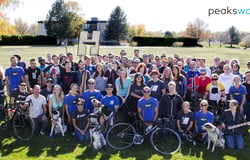As a member of the GPU AI/HPC Infrastructure team, you will provide leadership in the design and implementation of groundbreaking GPU compute clusters that powers all AI research across NVIDIA. We seek an expert to build and operate these clusters at high reliability, efficiency, and performance and drive foundational improvements and automation to improve researchers productivity. As a Site Reliability Engineer, you are responsible for the big picture of how our systems relate to each other, we use a breadth of tools and approaches to tackle a broad spectrum of problems. Practices such as limiting time spent on reactive operational work, blameless postmortems and proactive identification of potential outages factor into iterative improvement that is key to both product quality and interesting dynamic day-to-day work. SRE's culture of diversity, intellectual curiosity, problem solving and openness is important to our success. Our organization brings together people with a wide variety of backgrounds, experiences and perspectives. We encourage them to collaborate, think big and take risks in a blame-free environment. We promote self-direction to work on meaningful projects, while we also strive to build an environment that provides the support and mentorship needed to learn and grow.
What you'll be doing:
In this role you will be building and improving our ecosystem around GPU-accelerated computing including developing large scale automation solutions. You will also be maintaining and building deep learning AI-HPC GPU clusters at scale and supporting our researchers to run their flows on our clusters including performance analysis and optimizations of deep learning workflows. You will design, implement and support operational and reliability aspects of large scale distributed systems with focus on performance at scale, real time monitoring, logging, and alerting.
-
Design and implement state-of-the-art GPU compute clusters.
-
Optimize cluster operations for maximum reliability, efficiency, and performance.
-
Drive foundational improvements and automation to enhance researcher productivity.
-
Troubleshoot, diagnose, and root cause of system failures and isolate the components/failure scenarios while working with internal & external partners.
-
Scale systems sustainably through mechanisms like automation, and evolve systems by pushing for changes that improve reliability and velocity.
-
Practice sustainable incident response and blameless postmortems and Be part of an on-call rotation to support production systems
-
Write and review code, develop documentation and capacity plans, debug the hardest problems, live, on some of the largest and most complex systems in the world.
-
Implement remediations across software and hardware stack according to plan, while keeping a thorough procedural record and data log and Manage upgrades and automated rollbacks across all clusters.
What we need to see:
-
Bachelor’s degree in computer science, Electrical Engineering or related field or equivalent experience with a minimum 5+ years of experience designing and operating large scale compute infrastructure.
-
Proven experience in site reliability engineering for high-performance computing environments with operational experience of at least 2K GPUs cluster.
-
Deep understanding of GPU computing and AI infrastructure.
-
Passion for solving complex technical challenges and optimizing system performance.
-
Experience with AI/HPC advanced job schedulers, and ideally familiarity with schedulers such as Slurm.
-
Working knowledge of cluster configuration management tools such as BCM or Ansible and infrastructure level applications, such as Kubernetes, Terraform, MySQL, etc.
-
In depth understating of container technologies like Docker, Enroot, etc.
-
Experience programming in Python and Bash scripting.
Ways to stand out from the crowd:
-
Interest in crafting, analyzing, and fixing large-scale distributed systems.
-
Familiarity with NVIDIA GPUs, Cuda Programming, NCCL, MLPerf benchmarking, InfiniBand with IBoIP and RDMA.
-
Experience with Cloud Deployment, BCM, Terraform.
-
Understanding of fast, distributed storage systems like Lustre and GPFS for AI/HPC workloads.
-
Multi-cloud experience.
#LI-Hybrid
Top Skills
What We Do
NVIDIA’s invention of the GPU in 1999 sparked the growth of the PC gaming market, redefined modern computer graphics, and revolutionized parallel computing. More recently, GPU deep learning ignited modern AI — the next era of computing — with the GPU acting as the brain of computers, robots, and self-driving cars that can perceive and understand the world. Today, NVIDIA is increasingly known as “the AI computing company.”










